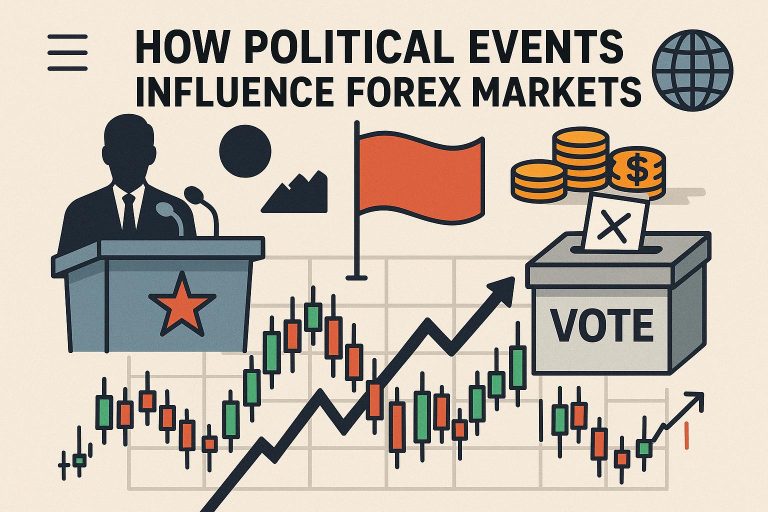The Connection Between Political Events and Forex Markets
The foreign exchange market, commonly referred to as forex, is a sprawling and decentralized global arena where currencies from around the world are traded against one another. Renowned for its immense scale and high liquidity, the forex market is intricate in its susceptibility to a plethora of factors. Foremost among these are political events, which wield significant influence over currency values. By comprehending the dynamic relationship between politics and the forex market, traders can equip themselves to make better-informed decisions when navigating the labyrinth of currency trading.
Political Stability and Economic Policies
Political stability plays an indispensable role in shaping a nation’s economic health and consequently the valuation of its currency. Nations characterized by political steadiness generally attract more foreign capital investment, fostering an environment conducive to the appreciation of their currency. In contrast, political turmoil can incite economic uncertainty, leading investors to withdraw their capital and triggering the depreciation of the national currency.
Government economic policies, which include decisions around taxation, fiscal spending, and monetary regulation, serve as pivotal elements that maintain or disrupt political stability. Such policies possess the capacity to mold the forex market by influencing the economic projections associated with a particular country.
Impact of Elections
As routine as they may seem, elections are potent political occurrences that vividly impact the forex markets. The period leading up to an election is often charged with uncertainty regarding its outcome, laying the groundwork for potential market volatility. Should a candidate, known for their pro-business stance and expected to apply policies favorable to economic development, gain traction, the national currency may experience fortification. In contrast, election results predicted to unsettle the current economic progression could lead to the currency’s depreciation.
In some scenarios, risk premiums might surface, as investors demand heightened returns for holding assets in politically unstable jurisdictions. This results in short-term declines for the currency until a resolution of political unpredictabilities is reached.
Geopolitical Tensions
The realm of forex markets is not impervious to geopolitical tensions, which include international disputes, trade disagreements, or diplomatic ruptures. Instances of military confrontations or international sanctions can stymie trade and impede economic progression, culminating in the depreciation of a currency. Similarly, trade wars between major economic powers yield far-reaching implications, affecting not only the currencies embroiled in the dispute but also those beyond, due to the intricate interconnections underpinning global commerce.
Central Bank Independence
Maintaining the independence of a nation’s central bank from political interference is vital for ensuring currency stability. Political developments hinting at potential governmental influence on central bank protocols can unsettle markets, precipitating a currency’s devaluation. In this context, traders are vigilant in monitoring political leader statements signaling possible shifts in central bank policy direction.
Forex traders meticulously analyze these political developments as part of their efforts to forecast currency behavior. While not exhaustive, grasping these fundamental interactions between politics and the forex market can provide vital insights for navigating the intricate topography of currency trading. Importantly, an awareness of the broader economic environment remains a core aspect of strategic trading.
Impact of Fiscal and Monetary Policies
Fiscal policies, determined by a government’s budgeting decisions involving taxation and public spending, are fundamental in shaping the economic landscape within which the forex market operates. A government’s decision to increase spending may stimulate economic activity, positively influencing currency strength if it leads to economic growth. However, excessive spending, particularly if funded by high levels of debt, may eventually lead to inflationary pressures, negatively impacting currency value.
Alternatively, monetary policies—which are typically carried out by a nation’s central bank—encompass adjustments to interest rates and money supply. Announcements concerning interest rate hikes or cuts are closely scrutinized by forex traders, as they have immediate repercussions on currency value. A rise in interest rates might attract foreign investment, prompting an increase in currency value, while a decrease could have an opposite effect.
The Role of Trade Policies
Trade policies form another critical dimension influencing the forex market. Tariffs, trade agreements, and economic partnerships can significantly affect a nation’s currency by altering trade balances. Positive trade policies that enhance exports or improve trade relations can bolster a currency’s value by supporting economic growth. Conversely, protectionist policies may result in trade deficits that could devalue a nation’s currency.
External Debt and Currency Valuation
A nation’s external debt levels can also hold a significant sway over its currency’s valuation in the forex market. High levels of external debt may raise concerns over a country’s ability to meet its obligations, deterring investors and leading to currency depreciation. As forex markets often react to perceptions of fiscal responsibility, countries perceived to manage their debt effectively are viewed more favorably, thus experiencing a stabilizing effect on their currency.
Government Intervention in Forex Markets
Occasionally, governments might actively engage in the forex markets to attain specific economic objectives, such as stabilizing their currency’s value or enhancing export competitiveness. This can be achieved via direct intervention, where a government or its central bank buys or sells its own currency in substantial amounts. Such interventions often serve as a temporary measure to counteract unwelcome speculative movements or to realign a currency to its perceived fair value. Observing such measures provides traders with insights into the potential near-term direction of currency movements.
Overall, the intricate interplay between political events and the forex market reflects the necessity of maintaining a holistic and informed approach to currency trading. Recognizing the multifaceted influence of political stability, fiscal and monetary policies, geopolitical tensions, trade policies, external debt, and government intervention can arm traders with the competencies required to navigate the volatile and expansive world of forex trading. Through continuous monitoring and assessment of these dynamics, one can better position themselves to make strategic trading choices within the ever-evolving currency market landscape.
This article was last updated on: September 4, 2025

